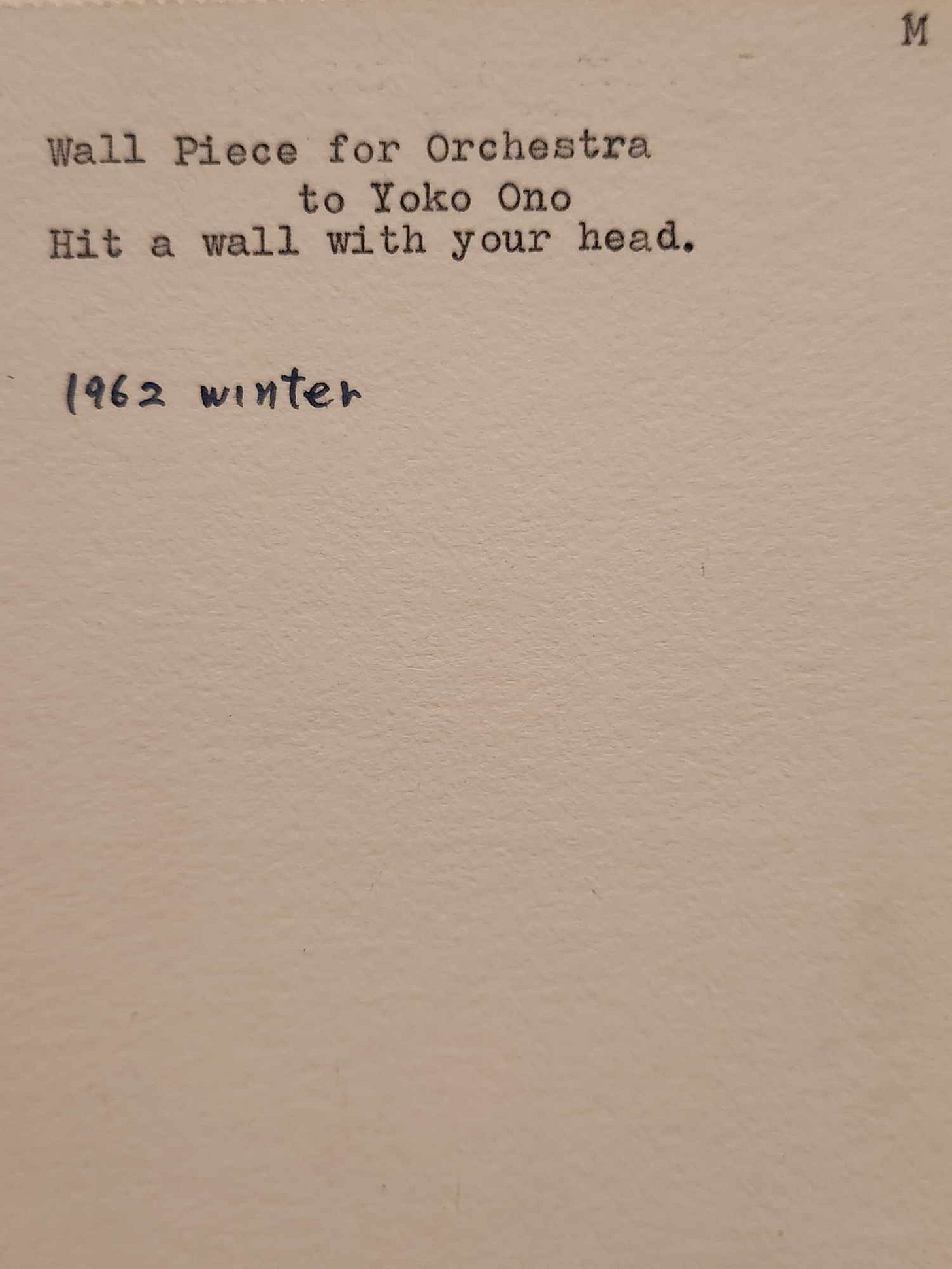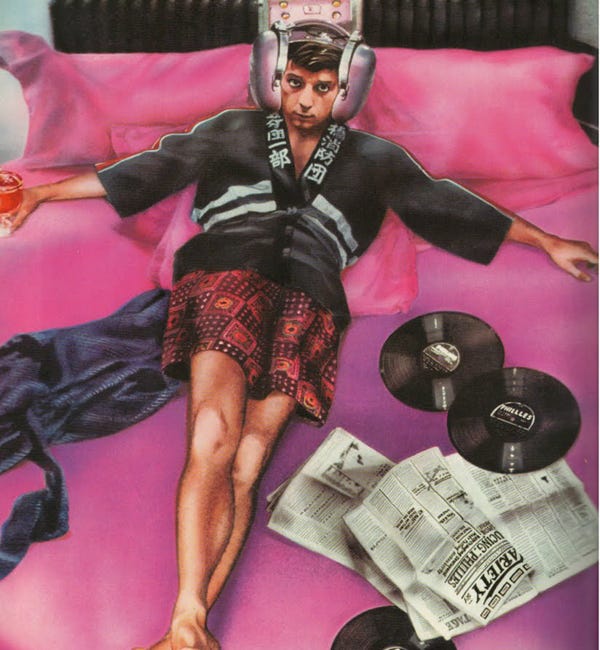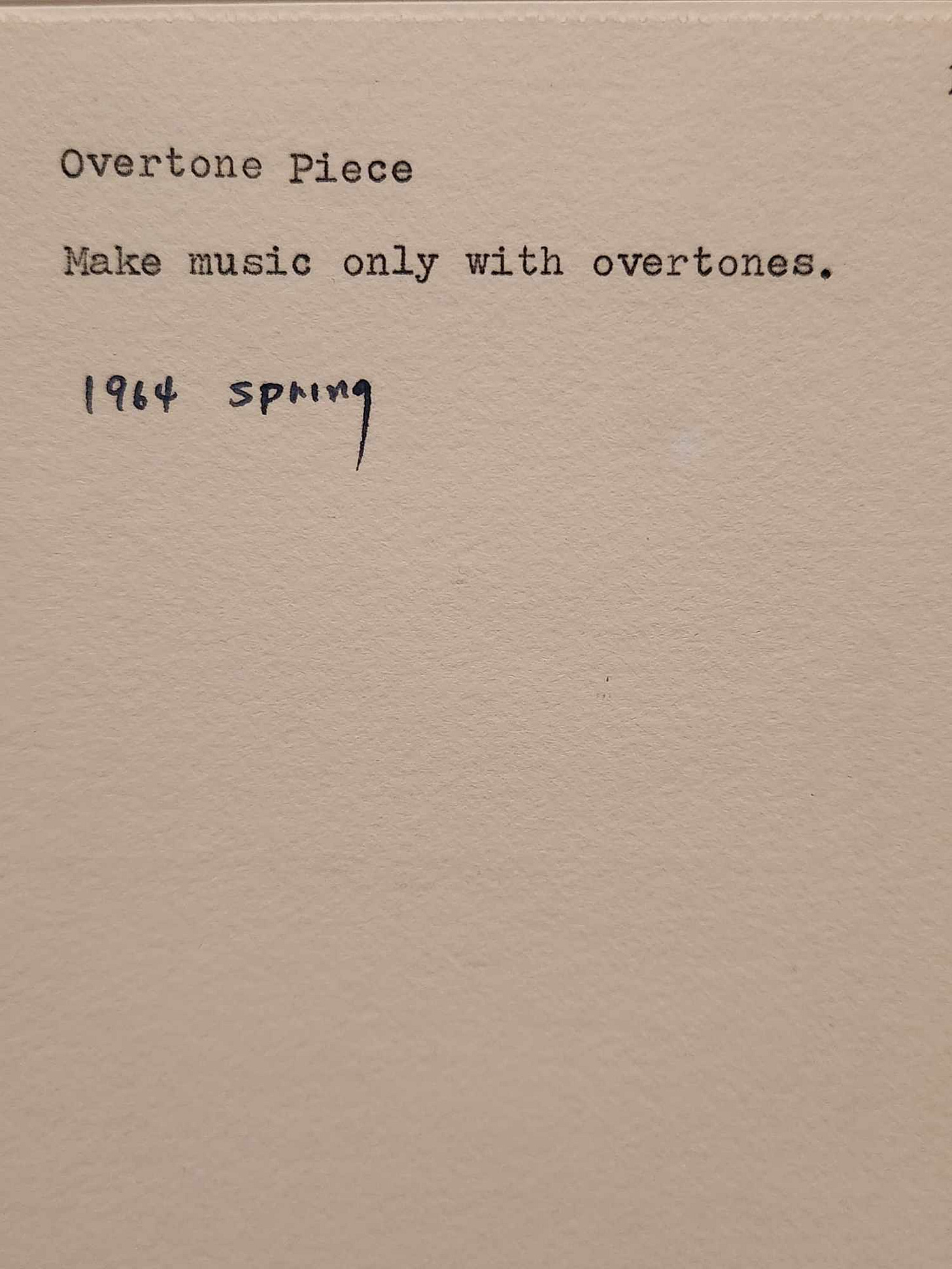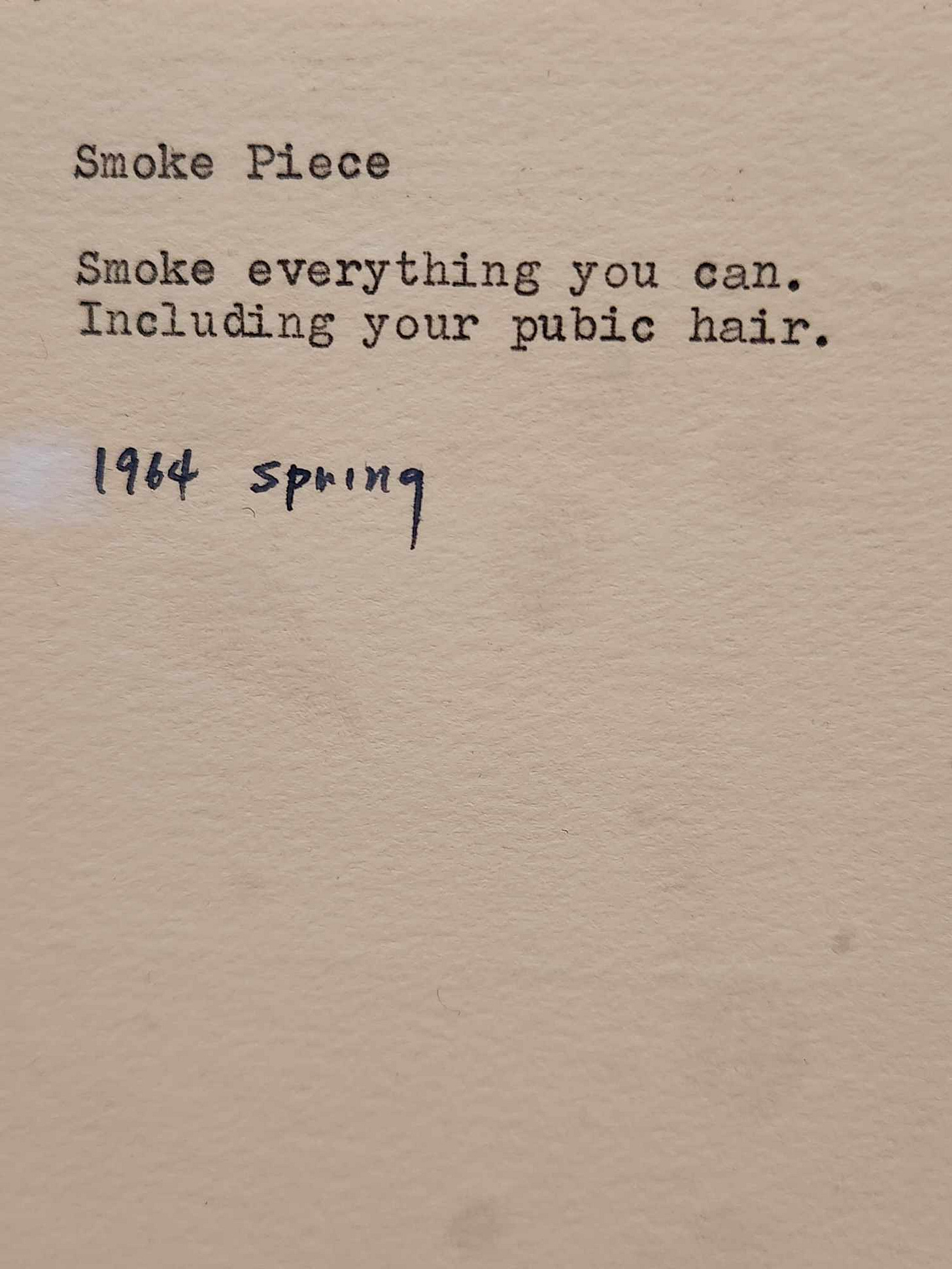The value of art-amusement must be lowered by making it unlimited, mass-produced, unobtainable by all and eventually produced by all. Fluxus art-amusement is the rear-guard without any pretension or urge to participate in the competition of ‘one-upmanship’ with the avant-garde. It strives for the monostructural and non-theatrical qualities of simple natural event, a game or a gag.
— George Maciunas, Fluxmanifesto on Fluxamusement 1965
As a kid, I was known for liking things no-one else my age claimed to like - brussels sprouts, liver, no doubt the taste of whiskey and beer. I don’t know why. When I started listening to rock music this instinct came in useful. I’d heard ‘The Ballad Of John and Yoko’, and read a bit about Yoko, an underdog I was well-prepared to like, given she was cool and hated, and John obviously liked her, before I first heard her sing, on the flipside of ‘Cold Turkey’, ‘Don’t Worry Kyoko (Mommy’s Only Looking For Her Hand In The Snow)’.
This jam had me from the start - it’s the heaviest groove John Lennon ever laid down, and what Yoko does over it, no-one else would ever do. Its intensity demands to know where you stand, and I stood with Yoko, whose performance here is liberating. For years ‘Don’t Worry Kyoko’ served as a shibboleth for whoever I might want in my band - if you smiled when you experienced Yoko’s attack, and your hand didn’t start reaching for the tone arm before four minutes was up, you might just enjoy jamming with me.1 I’m pretty sure Public Image Limited were formed the same way. Of all the hit acts looking for post=pop credibility, only The Beatles actually had a (Japanese no less) avant garde artist in the studio - imagine if Andy Warhol had sat in and occasionally contributed to those VU records as Yoko contributed to The White Album.
How Phil Spector Invented Glam Rock
Most great pop music is reductive. Its creator has listened to some old or new favourite or their own meanderings and realized that there’s one weird trick in there that’s underutilized, underheard. So they extract it, magnify it, simplify it. Some rocking blues fill, perhaps first hea…
I wrote in this earlier post about John and Yoko “Music is a concept by which we measure our pain, and for the rest of his life John Lennon will be making psychotherapeutic music, in which the screams will eventually turn to memes.” Around the time of Lennon’s murder in 1980 it seemed to many, including me, that Yoko, swaddled as she had become in wealth and privilege and family life, was at risk of becoming another relic of a generation that no longer did relevant things. But little did I know; Yoko’s 1985 single ‘Hell In Paradise’ went to #16 in the US dance charts.
In recent years Yoko’s charming ‘Nobody Sees You Like I Do’ turned up on Hayley’s playlist, arranged somewhat in the style of Lennon’s ‘Mind Games’, but we had no idea that it was a remix and just part of a massive remix industry that had grown round Ono in the years since her dancefloor smash until I caught Peaches’ remix of ‘Kiss Kiss’ on Radio 101. At this point I rather belatedly woke up to how well Yoko’s singing, and her Fluxus ideals, work in an electronic context.
Both ‘Nobody Sees Me Like You Do’ and ‘Kiss Kiss Kiss’ are from the 2007 remix album Yes, I’m A Witch. This isn’t the first Yoko Ono remix project - in 1996, songs from her 1995 album Rising, recorded with her son Sean Ono Lennon’s band Ima, were remixed by artists including Ween, Tricky, and Thurston Moore, and the series of dance remixes of ‘Walking On Thin Ice’ was a hit in 2003, but I think Yes, I’m A Witch is the best place to start listening to the remix side of Yoko Ono. Open Your Box, released later the same year, collects earlier remixes, and the Pitchfork review amusingly comments on their 1990’s feel
”hearing Ono over these bombastic butt-wigglers did make me happily nostalgic for 90s dance music, for which I was grateful. Little Louie Vega is not your enemy, and neither is Yoko Ono”
But Yes, I’m A Witch is something else, across its many variations of style it makes a convincing statement that Yoko somehow saw everything coming. Though still in places processed into the “interchangeable disco dolly” of some of those earlier remixes, not that there’s anything wrong with that, she reminds me at several points of every woman who’s ever done anything original in the modern age without learning to sing properly first. At the same time, no artist has ever felt as present in their remixes. It’s hard not to believe she’s pulling every string. Here’s Public Enemy producer Hank Shocklee’s version of the title track.
The feminist anthem ‘Sisters Oh Sisters’, originally given a scrappy yé-yé treatment on John and Yoko’s agitprop album Some Time in New York City (1972), is turned into a synthesizer dub groove by Le Tigre and made more militant by Kathleen Hanna’s megaphoned street-preaching interjections (dub is also the basis of another excellent remix, DJ Spooky’s ‘Rising’).
Generally, the more a song strays from the original into electronica and experimental territory here the better it is, but one exception is The Death of Samantha, remade in an alt-country gothic style redolent of Gram Parsons by Porcupine Tree.
Ev'ry day I thank god
That I'm such a cool, chick baby
When I'm with people, I thank god,
I can talk hip when I'm crying inside
When I'm with friends, I thank god,
I can lit a cigarette when I'm choking inside
Something inside me died that day
You could be forgiven for thinking that ‘Death of Samantha’ refers to Yoko’s state of mind after witnessing the murder of her husband by a suicidal Beatles fan who, as a born-again Christian, felt betrayed by John’s famously anti-clerical statements and the hypocrisy inherent in his social activism.2 But, according to Sean, ‘Death of Samantha’, originally from 1973’s Approximately Infinite Universe, "was all about dad having sex with some girl at a party where my mom was" on the night in 1972 when the couple’s then-nemesis, US president Richard M. Nixon, won re-election.3 There are other songs that seem to reference the murder but don’t, like ‘Mrs Lennon’ from Fly (1971), remixed on 2017’s Yes, I’m a Witch Too
Silver spoon
O' silver spoon
I lost my silver spoon
And our children, o' our children
Did they have to go to war?
Yes, my love, it's okay
Half the world is always killed, you know
Husband John extended his hand
Extended his hand to his wife
And he finds, and suddenly he finds
That he has no hands
This was always Yoko’s songwriting method, to be open about her feelings, in sparse and simple poetry, daring the universe to add its own meaning to her subjective truth. This propensity, allied to her tonally uncertain singing, as seemingly affectless as her poetry, her consummate non-musicianship, and her openness to stylistic innovation and the updating and transformation of her past selves, makes the Yoko Ono revealed by her remixes seem like the presiding spirit of the music on my playlist today.
And yet, Yoko Ono’s 21st Century rebirth wasn’t solely depend on younger hands adapting isolated vocal tracks from her 20th Century works - 2013’s Take Me To The Land Of Hell, recorded with Sean and friends under the Plastic Ono Band name, has a varied electronic palate and fits perfectly beside Yes, I’m A Witch, and a couple of revisions on the Witch albums have pop-metal arrangements by Jack Douglas, the Lennon’s engineer since ‘imagine’ and producer of the best-selling Double Fantasy.4
Here’s the original of ‘Move On Fast’, released in 1973, and sounding a lot like the prematurely post-punk new wave of Amon Düül II’s Vive La Trance, released that same year.
Bury your past an' move on fast,
Nothin's gonna last, so roll a bit of grass
An' move on, move on fast.
‘Move On Fast’ is, and especially in 1973, pretty fucking great, and sounds more vital than her husband’s output that year. Elephant’s Memory, like Amon Düül II on Vive La Trance, are sounding a lot like early Roxy Music.
Amongst so many other things, Yoko Ono, who wanted at first to be Schoenberg or Webern, gave the anglophone world in those years an ersatz but perfectly convincing foretaste of J-Pop. And, for those that still haven’t heard much of that, she hasn’t stopped. The Miike Snow remix of ‘Catman’ from 2017 contains most of the elements of hyperpop, albeit in a sprawling long form.5
‘Coffin Car’, as reimagined by Automatique, sounds like a John Cale song, and in other places Yoko reminds me of Lou Reed, whether that’s from a New York state of mind or the idea of throwing poetry down on a simple pop song.
Sean Ono Lennon, hero of the Fat White Family book Ten Thousand Apologies, remixes his mum’s dopey, Beatlesque ‘Dogtown’, and it needs to be said that having a kid who’s also into music and has abundant taste and talent is always a good way to stay in touch.
Someday I'll be remembered for the fine words I meant to keep
A warm smile I meant to leave
And a true song I meant to finish writing all my life
As well as tracks on the Witch remix albums, Yoko recorded an EP with The Flaming Lips in 2011, and this conceptually arty, often quiet album with Kim Gordon and Thurston Moore in 2012. She’s withdrawn from public appearances now, at the age of 90, but I imagine her listening to The Collective right now.
We know how Yoko sounded with The Beatles, on songs like ‘Bungalow Bill’, ‘Revolution #9’ and ‘Give Peace A Chance’, but have you heard her with The Beach Boys? Andrew Moore’s mash-up gives us her ‘Don’t Worry Kyoko’ voice at its best.
Algorithimic Offspring - Lana Del Rey & Sean Lennon - Tomorrow Never Came [Live at the Hollywood Bowl - October 10th, 2019]
There was also ‘Listen The Snow Is Falling’, the flip-side of ‘Instant Karma’ a gentle bit of folk-pop covered by Galaxie 500 and Harry Nilsson, and the weird and believed to be rude ‘Open Your Box’ on the B-side of ‘Power To The People’.
"He told us to imagine no possessions and there he was, with millions of dollars and yachts and farms and country estates, laughing at people like me who had believed the lies and bought the records and built a big part of their lives around his music." Mark Chapman.
"Many fans sent me the 'Death of Samantha' lyrics saying that it was uncanny that the lyrics seemed to be describing the vigil. They said, 'You were talking about now.' It was very sad but in a way it was kind of spot-on." - Yoko Ono
In 1984 Jack Douglas sued Yoko for unpaid royalties from Double Fantasy, the jury awarding him $2.5 million. That we find him working with her later tends to contradict the picture Albert Goldman paints in The Lives of John Lennon, of a vengeful woman who never forgets a slight.
I can’t find anything online about Yoko’s influence in Japan, but Yoko recorded a single in Japanese in 1973, only released in Japan, ‘Joseijoi Banzai pts 1 & 2’, a pop arrangement of Imperial Japanese war songs with a feminist message.









No worries 😉 loved hearing this again...gosh 30yrs later at least. John Lennon sure in the groove. Kinda Beefheart Mirror Man vibes n all. Cheers